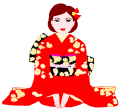|
|
These
attractive shrubs are mostly appreciated for their spring
flowers and for their many-coloured autumn fruits. The most used
bonsai variety is Malus cerasifera, Nagasaki wild apple, with
its plentiful blossom and fruit production. The pink buds become
white flowers, which generate a lot of cherry-shaped red fruits.
M. halliana, Hall's wild apple, produces lovely pink flowers and
glittering green leaves, while the violet fruits are small and
scattered. M. "Golden Hornet" keeps its yellow fruits
for a long time after the fall of the leaves. Other bonsai
varieties are M. "Red Jade" and M.
"Profusion".
|
|
|
|
|
.gif) |
|
|
|
|
|
|
|
Direct
light or sunlight during the whole year. Malus
can bear very cold winds, anyway it is advisable
to shelter the bonsai roots in low-edged
containers.
|
|
|
|
|
|
|
|
Everyday
during the vegetative season. Water it copiously
when the tree bears fruit, to avoid apples to
wither and fall. The tree can go mouldy:
sprinkle its leaves periodically.
|
|
|
|
|
|
|
|
Every
week, before the blossom. Do not fertilize when
the fruits begin to grow, because the foliage
could develop too much and spoil the fruits.
|
|
|
|
|
|
|
|
Every
year at the beginning of spring, before the buds
open. Use base mould.
|
|
|
|
|
|
|
|
In
spring, pinch the new shoots to 1-2 leaves,
using your fingers; shorten the too long twigs
in autumn.
|
|
|
|
|
|
|
|
Grafting
is the most used method. By seeds in late autumn
or by layers in spring or in early summer.
|
|
|
|

Suitable
for every size and for Informal Upright, Slanting,
Windswept, Double Trunk, Common Stump styles. For little
bonsai trees, choose the varieties with smaller fruits.
|
|
| |
|
|
|
|





